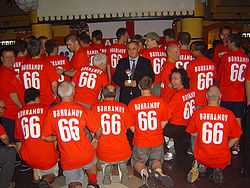Tofiq Bahramov
| Tofiq Bahramov | |
|---|---|
 Bahramov on Azerbaijani postage stamp | |
| Born |
29 January 1925 Ağcabədi, Transcaucasus, Soviet Union |
| Died |
26 March 1993 (aged 67) Baku, Azerbaijan |
| Nationality |
USSR Azerbaijan |
| Occupation | Referee |
Tofiq Bahramov (Azerbaijani: Tofiq Bəhramov; Russian: Тофик Бахрамов; 29 January 1925 – 26 March 1993), commonly known as the Russian linesman in England, was a Soviet footballer and football referee from Azerbaijan notable for being the linesman who helped to award a goal for England in the 1966 FIFA World Cup Final against West Germany. He was later rumoured to have been presented with a golden whistle by Queen Elizabeth II for his "services to England".[1][2] As a referee earlier in the tournament, he drew attention for denying a Swiss goal in a first round game between Switzerland and Spain.
Career
Bahramov was originally a footballer playing for Neftchi Baku, but a serious leg injury prevented him from continuing his playing career and he became a referee.[3] He was elected onto the FIFA panel of referees in 1964. After retiring as a referee, he subsequently served for some years as general secretary of the Football Federation of Azerbaijan.[4]
"Wembley Goal"
In the 1966 World Cup Final, with the score at 2–2 and after 11 minutes of the first period of extra time, Geoff Hurst of England fired a shot on goal which bounced off the crossbar sharply downwards, hit the ground, and then span backwards away from the goal. There were some moments of indecision by referee Gottfried Dienst before he noticed that Bahramov, who was the linesman at that end of the ground, was signalling to him. Eventually, Dienst awarded a goal to England, who went on to win the game 4–2.

The decision to award the third England goal is still debated. In England, it is commonly believed that the decision was correct, while in Germany it is commonly said that Bakhramov made a mistake, and the goal has entered the German vernacular, as any situation in which a ball hits the crossbar and is reflected downwards, landing just before or behind the goal line, is described as a "Wembley-Tor". After the match, many newspapers referred to the "Russian linesman" who awarded the goal, as Azerbaijan was part of the Soviet Union at the time, and the nickname stuck to the point where his real name was all but forgotten.
According to the Laws of the Game, for a goal to be awarded, the ball must cross the goal line, with its full diameter behind the full width of the line. The Germans argue that if that were the case, the ball would likely have bounced from there into the net, not out on the field as it did. In addition, German players claimed to have seen chalk dust, which would indicate it was not a goal. The English counter by saying that the back-spin put on the ball after hitting the crossbar could just as likely have caused the ball to bounce behind the line and then back out of the goal—as had happened in a later match between the two countries. Roger Hunt claimed to have seen the ball bounce behind the line.
When Bahramov wrote his memoirs, he stated that he believed the ball had bounced back not from the crossbar, but from the net, so the further movement of the ball was already insignificant, and not visible for him either. Bahramov loved refereeing and the game of football in general, and described football matches as,
"duels...full of unforeseen turns and even real miracles. And who does not want to be a magician if even for just 90 minutes?"[citation needed]
An apocryphal story exists that Bakhramov, when asked why he gave the goal later, simply replied "Stalingrad". Stalingrad is the name of the city in the then Soviet Union in which over 750,000 Soviets died against Nazi Germany. However, there is no evidence that this story is genuine.
A 1996 study by Ian Reid and Andrew Zisserman (University of Oxford) came to the conclusion that the ball was at least 6 cm away from being a goal.[5]
Legacy
The Azerbaijan national stadium is named the Tofiq Bahramov Stadium in his honour. When England were drawn in the same group as Azerbaijan in qualifying for the 2006 FIFA World Cup, a ceremony was held prior to the meeting at the stadium to honor his memory, with attendees including Geoff Hurst, Michel Platini and Sepp Blatter. A statue of him was also unveiled at the ceremony and he became the first referee to have a stadium named after him.[6][7] During the same visit, his son Bahram Bahramov met representatives of the English fans and expressed his pleasure that the famous "Russian linesman" of 1966 had finally regained his true nationality. "Now that Azerbaijan is independent it’s very right for him to be remembered as a member of the Azeri nation. People like Tofiq Bahramov are only born once in a hundred years.”[1]
References
- ↑ 1.0 1.1 Azerbaijan v England article by Chris Hunt published in Football First newspaper, 17 October 2004
- ↑ Winning smile behind the Azeri article by Jonathan Northcroft published in The Sunday Times newspaper, October 2004
- ↑ "Сын Тофика Бахрамова рассказал о своем отце (Интервью)". Azerifootball.com (in Russian). Retrieved 16 April 2013.
- ↑ Tofiq Bəhramovun xatirəsi əziz tutulur (Azerbaijani)
- ↑ Ian Reid and Andrew Zisserman: Goal-directed video metrology. In: Proceedings of the 4th European Conference on Computer Vision, LNCS 1065, Cambridge 1996, Volume II, p. 647–658, Lecture Notes in Computer Science, DOI 10.1007/3-540-61123-1, available online here or here
- ↑ Abidəsi olan ilk hakim (Azerbaijani)
- ↑ Tofiq Bəhramovun anadan olmasından 78 il keçir (Azerbaijani)